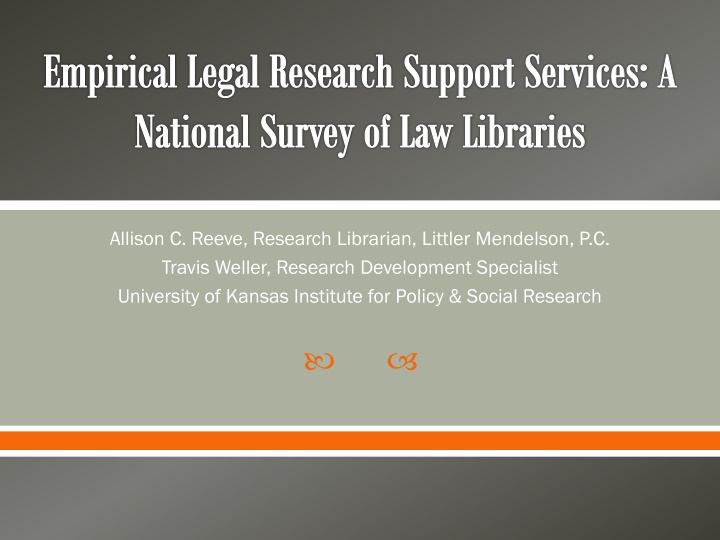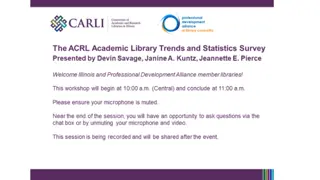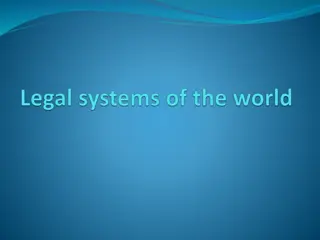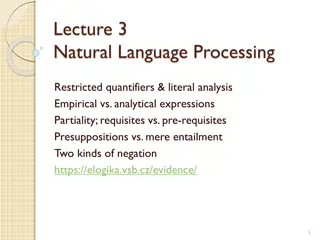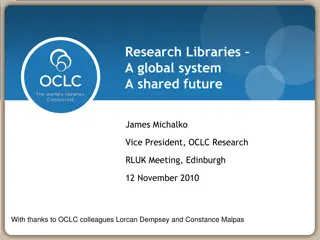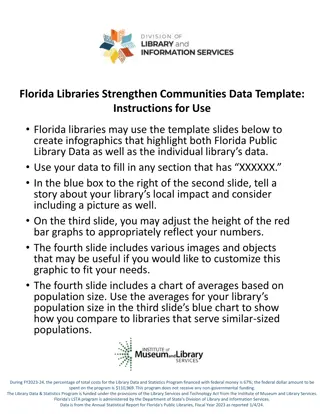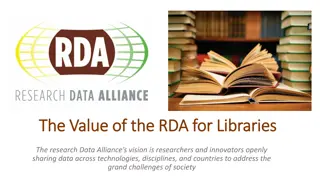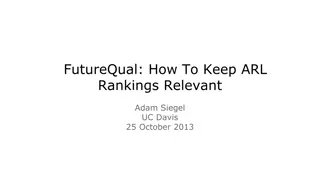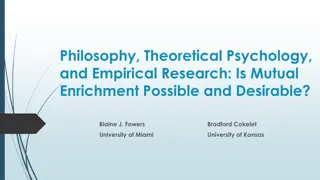National Survey of Law Libraries: Empirical Legal Research Services
Investigate trends in empirical legal research support among academic law libraries, exploring ELR services and their variations based on ranking. Discuss the rise in ELR by law faculty, the lack of studies on legal research practices, and the emergence of ELR librarian positions. Highlight advancements in social science background among law professors, dedicated law journals, and the experiences of hiring ELR librarians at institutions like Yale.
Download Presentation

Please find below an Image/Link to download the presentation.
The content on the website is provided AS IS for your information and personal use only. It may not be sold, licensed, or shared on other websites without obtaining consent from the author.If you encounter any issues during the download, it is possible that the publisher has removed the file from their server.
You are allowed to download the files provided on this website for personal or commercial use, subject to the condition that they are used lawfully. All files are the property of their respective owners.
The content on the website is provided AS IS for your information and personal use only. It may not be sold, licensed, or shared on other websites without obtaining consent from the author.
E N D
Presentation Transcript
Empirical Legal Research Support Services: A National Survey of Law Libraries Allison C. Reeve, Research Librarian, Littler Mendelson, P.C. Travis Weller, Research Development Specialist University of Kansas Institute for Policy & Social Research
Acknowledgements acknowledge the support of Joyce McCray Pearson, Christopher Steadham, and Ja net Miles thank all of our survey respondents and law library faculty members who sent notes of encouragement
Project Goals Describe extent and nature of empirical legal research (ELR) services in academic law libraries Determine if support varies among ranking Inform peers of trends in ELR support
Defining Empirical Legal Research (ELR) The investigation of legal and justice- system related questions attempting to understand a topic through data-driven, statistically based, controlled experiments, interview responses, case studies, historical analyses or other quantitative or qualitative data collecting mechanisms
Defining Empirical Legal Research (ELR) The investigation of legal and justice- system related questions attempting to understand a topic through data statistically based, controlled experiments, interview responses, case studies, historical analyses or other quantitative or qualitative data collecting mechanisms data- -driven driven,
Previous Work on ELR Shows: ELR by law faculty on the rise Lack of studies on practice of legal research ELR support marketed on some websites A few ELR librarian positions do exist
The Next Big Thing More law professors have advanced experience in social science disciplines Law journals exist that focus on empirical legal research Empirical Legal Studies community and Law and Society, Law and Economics Experiences of hiring of ELR Librarian at Yale
Academic Libraries Empirical research is the norm Expanding data services Few librarians consider research data services a primary role
Methods Nationwide survey of academic law libraries Distributed January and February 2015 Questions on each phase of an ELR project; from inception to archiving
Responses 62 surveys available for analysis (30% of ABA accredited law schools) 54 identified institution
Limitations Interpretation of questions Unknown number of participants on directors listserv
Conclusions (1/2) Empirical legal research is increasing, according to librarians Only a few faculty members at each school conduct ELR Law libraries most commonly assist with identifying and using existing datasets Sizable minority provide more in-depth services including data storage, archiving assistance, analysis, and research design; especially at higher ranking institutions
Conclusions (2/2) Few libraries have solely dedicated staff to support ELR; high ranking schools are more likely to employ one One-third have staff proficient with quantitative analysis software, fewer have qualitative data proficiency Schools ranked 101-150 are more likely to have plans to expand ELR services
Opportunities Cross-campus collaboration Future study The trend of hiring ELR Librarians Survey of faculty and deans on research habits Non-academic libraries
